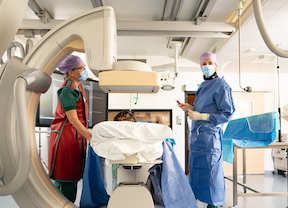PhD position exposome data science & disease prediction
PhD position exposome data science & disease prediction
You cannot apply for this job anymore (deadline was 31 May 2021).
Browse the current job offers or choose an item in the top navigation above.
Job description
Epidemiological and statistical analysis of exposome data poses unique challenges due to the high and complex correlations between at least some of the components, the high number of features to be evaluated, the need to accommodate complex (e.g. zero-inflated or skewed) exposure and outcome distributions, and the potential non-linear relations and interactions between components and outcome favoring the use of semi- or non-parametric models. While several approaches have been proposed to address these issues computationally, their practical use and interpretation in an exposome context remains largely unknown. A first objective of this PhD will be to use real-life data describing the European exposome in greater detail than ever before to review and adapt these statistical approaches, to evaluate potential mixture effects, and to infer the marginal contribution of individual exposome components to (i) the overall biological response to the environment, and (ii) the exposome-related disease risk. This PhD will further extend exposome profiling to a causal framework and will specifically develop approaches for high-dimensional causal inference. The final objective will be to improve individualized disease prediction using exposome data.
High dimensional causal inference has only recently started to attract attention. This project will focus initially on three existing approaches that directly address the issue of causality when looking at environmental mixtures and/or high-dimensional data (e.g. OMICs): the multivariable Generalized Propensity Score (mvGPS) approach, the quantile-based g-computation approach, and a tool that combines the flexibility of g-computation with a SuperLearner algorithm. The PhD student will apply these methods to various large prospective cohorts with high-dimensional exposure and OMICs data to identify causal factors related to cardiometabolic and pulmonary health.
It has been suggested that using Machine Learning (ML) approaches for disease prediction may provide more accurate results than using traditional statistical models when using high-dimensional and heterogeneous exposome data. Among several other competing methods, Orthogonal 2-Way Partial Least Squares (O2PLS) has been suggested as an efficient tool to derive composite scores that could be used to integrate the information from the exposome and other 'omics' and/or demographic data. The PhD student will contribute to the ongoing development of a supervised version of O2PLS that can directly predict the target and that could be used to obtain exposome risk scores for the target. The aim is to use a penalized version of the O2PLS model to assess the overall and marginal contributions of exposome features (or mixtures thereof) to disease prediction. Other ML algorithms (e.g. random forest or neural networks) will be evaluated to address non-linear relations and to accommodate more complex interaction structures.
Specifications
- Utrecht View on Google Maps
Requirements
We are looking for a candidate with:
- An MSc in biostatistics, (computational) epidemiology, (medical) statistics, or a related discipline
- An interest in public health and prevention
- Strong programming skills, experience in statistical analyses/machine learning with Python and R, and ideally experience working with big data
- The ability to work independently and also collaborate in a multidisciplinary team, and someone who is highly self-motivated with strong problem-solving skills
- Proficiency in written and spoken English
Conditions of employment
The initial contract will be for a period of one year, which will be extended to a total of four years upon successful assessment.
The minimum salary for this position is €2,495.00 gross per month and the maximum salary is €3.196.00 gross per month based on full-time employment (36 hours).
In addition, we offer an annual benefit of 8.3%, holiday allowance, travel expenses and career opportunities. The terms of employment are in accordance with the Cao University Medical Centers (UMC).
Department
Julius Center
This PhD position will be hosted at the Julius Center for Health Sciences and Primary Care, which is part of the University Medical Center Utrecht. The UMC Utrecht is a leading international academic medical center where knowledge on health, illness and care is generated, evaluated, shared and applied for the benefit of patients and society. The Julius Center is a leading and multidisciplinary research center with four primary research programs: cancer, cardiovascular health, infectious diseases, and methodology of epidemiology. You will be appointed at the Department of Public Health and work closely with the Department of Biostatistics and Research Support and the Methodology Research Program.
You will also collaborate closely with the Institute for Risk Assessment Sciences (IRAS) at Utrecht University. Utrecht University is highly ranked and one of the largest universities in the Netherlands. The mission of IRAS is to provide education and research on the human and environmental health risks of exposure to potentially harmful agents in the environment.
Both the Julius Center and IRAS are located at the Utrecht Science Park, which the highest concentration of knowledge institutions in the Netherlands. You will be embedded in a large network of exposome science researchers (taking part in e.g., the H2020 EXPANSE project, Exposome-NL Gravitation program).
You will be supervised by Professor R.C.H. (Roel) Vermeulen and Professor M.J.C. (René) Eijkemans.
:fill(white)/logos/umcu-en-wide.jpg)
